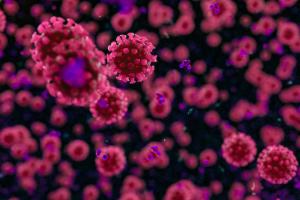When James Matera, DO (above right), took over the role of chief medical officer at CentraState in March 2019, little did he know that his leadership skills would be put to the ultimate test a year later. While the COVID-19 crisis challenged the medical center, Dr. Matera and other clinical and administrative leaders quickly developed new ways to deliver care that kept staff and patients safe.
“Early on, we recognized that treating patients with COVID-19 presented a different set of circumstances, so we knew we had to devise new parameters for care,” explains Dr. Matera.
CentraState quickly mobilized teams of physicians dedicated specifically to treating patients with COVID-19. Infectious disease physicians and other clinical specialists brainstormed creative ways to evaluate and treat patients who tested positive or exhibited symptoms. The team-based, coordinated approach also helped preserve personal protective equipment (PPE) and limit healthcare workers’ exposure to COVID-19.
“With creative thinking, we were able to limit the number of providers who had to enter each room while still providing compassionate care,” explains Ramanasri Kudipudi, MD (above left), who is board certified in internal medicine and infectious disease.
To ensure providers and other staff felt safe and supported during the crisis, Dr. Matera focused on frequent, candid communication. As more information about the virus became known and the number of patients with COVID-19 grew, the team adapted and refined its process.
“It takes a leap of faith to put yourself in harm’s way,” Dr. Matera says. “The leadership team was transparent about the crisis, and we delivered ongoing, consistent information to all of our teams at all levels of the organization.”
Access to Cutting-Edge Treatment Options
Because there is not yet an approved treatment for the virus, treatment options vary for each patient. Several patients with COVID-19 were approved to begin the Food and Drug Administration’s clinical trial of the antiviral medication remdesivir, while other patients were treated with convalescent plasma through a partnership with the American Red Cross. Convalescent plasma is an antibody-rich product made from blood donated by people who have recovered from the disease.
“If our teams are confronted with something of this magnitude again, we know that we will rise to the challenge,” says Dr. Matera. “This experience will dramatically change how we deliver care—and how we live our lives.”
“As humans, we learn to evolve and adapt to survive,” adds Dr. Kudipudi. “We are social creatures, but we found new, safe ways to maintain social bonds. We lived through fear and uncertainty, yet we prevailed in finding a new normal.”





